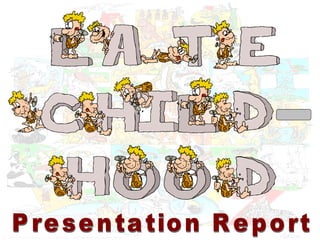
Late Childhood Presentation Report
- 2. Late Childhood > 9 – 12 yrs. Old > a TROUBLESOME AGE by which a children are no longer willing to do what they are told to do > at this stage that the children acquire the rudiments of knowledge that are considered as essential for successful adjustment to adult life > there is a gang spirit in this stage in which the major concern is the acceptance by the age-mates in a group; there is a team spirit in play activities and creative works
- 3. Late Childhood (9-12) Middle Childhood (6-8) ? - ? - ? - ? - ?
- 4. Middle Childhood (6-8) Positive, caring environment, praise and encouragement, all experience success. (Including parent support of these needs). Considers ideas and emotions of others, attention span, cautious or adventurous, decision making opportunities, simple instructions, opportunities for creativity and exploration. Enjoyment, group work, individual work, rotation of roles, cooperative work, attention from teacher/coach, leadership opportunities. Variety of activities, frequent rest periods, skill learning through play, focus on fundamental gross motor skills, modification of rules and equipment, no warm-up, progressive activities, full participation. Emotional Cognitive Social Physical
- 5. Late Childhood (9-12) Positive, caring environment, praise and encouragement, all experience success (including parent support of these needs), use of role models, success in meeting challenges, feeling of self-worth, mood swings. Leadership skills, differing reasoning skills, use of analogies in explanation, decision-making and problem solving opportunities, individual identify, social comparison. Enjoyment, individual work, rotation of roles, cooperative work, independent responsibility, problem solving activities, leadership opportunities, fair play, shared expectations, team culture. Variety of activities, more complex motor skills, strength, balance and coordination, small warm-up, progressive activities, catering to different growth rates. Emotional Cognitive Social Physical
- 6. Late Childhood’s PHYSICAL DEVELOPMENT, MENTAL and COGNITIVE DEVELOPMENT, and EMOTIONAL DEVELOPMENT
- 12. Related Theories in Late Childhood (9-12)
- 13. Concrete Operational Stage > 7 – 11 yrs. Old > Part of jean Piaget’s Theory of Cognitive Development > The child have overcome most of the limitations of the previous stage, and his thought is both more logical and flexible. > In this stage, the child have the ability to understand PRINCIPLES OF CONSERVATION, and think in a reversible and operational fashion. > The older child is capable of SERIATION or the ability to order objects to some quantitative dimension (e.g., from smallest to biggest, shortest to longest). > CLASSIFICATION or recognizing hierarchical relations between sets and subsets is also emerge on this stage. > A child in this stage can also solve TRANSITIVE REASONING.
- 15. Preconventional Morality > 4 – 11 yrs. Old > Part of Lawrence Kohlberg’s Theory of Moral Development > The primary consideration of children at the preconventional level is the act to the self. > In this stage, behaviors are motivated by self-interest, avoidance of punishment, or the attainment of rewards. > PUNISHMENT and OBEDIENCE ORIENTATION occurs at stage 1, wherein children at this age define good and bad in terms of obedience or disobedience to rules and authority figure. > In stage 2, REWARD ORIENTATION emerge, wherein children may behave well and do good deeds in anticipation of a reward.
- 17. Latency Stage > 6 – 11 yrs. Old > Part of Sigmund Freud’s Psychosexual Theory of Development > In this stage, there is a temporary repression of the libido > The sexual and aggressive drives are now expressed in socially accepted forms (REPRESSION and SUBLIMATION). > Peer relationships and the school are the child’s primary preoccupations. > The id, ego, and superego is balanced. > This is also the period of RELATIVE CALM
- 19. Industry versus INFERIORITY > 6 – 11 yrs. Old > Part of Erik Erikson’s Psychosocial Theory of Development > The school is the main preoccupation of children at this age, this period is thought of as a time of APPRENTICESHIP or learning and developing knowledge and skills. > This is the time when the children begin to engage more seriously in hobbies, extra curricular activities, and other lessons. > In this stage, COMPETENCE and MOTIVATION develops.
- 21. Scaffolding > 4 and above > One of the Theory in Learning of Lev Vygotsky > Scaffolding is a form of learning that student help and assist other students to learn, which is easier for the students to learn from one another than a teacher at times. > By providing instructions and help in he context of the learner's activity, tutors provide a structure to support the learner's problem solving. > Effective guidance involves the transfer of responsibility from tutor to learner.